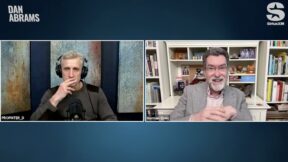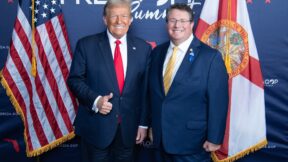Fox Host Calls BS on Trump Tariff Scheme to Treasury Chief’s Face: ‘Odd Way to Look at It’
Fox Business Network host Larry Kudlow called BS on Trump Treasury Secretary Scott Bessent over the formula President Donald Trump used to come up with so-called “reciprocal tariffs.”
The stock market dropped like a boulder as soon as the opening bell rang last Thursday morning after Trump announced his tariff program, which included an elaborate chart listing what Trump says the U.S. is being “charged” by other countries and a corresponding “Discounted Reciprocal Tariff” for each country.
On Monday’s edition of Fox Business Network’s Kudlow, the host repeatedly challenged Bessent over the “odd” inclusion of trade deficits in the calculation:
KUDLOW: So, there’s some confusion about these numbers. We looked up the International Trade Administration, shows Japan with a 4.3 percent average tariff, 4.3 percent average tariff, OK? But in the chart that President Trump showed last week the so-called reciprocal charge offs, it has Japan at 46 percent.
Now, I know how you get to 46 percent using deficits as a — trade deficit as a share of imports. But that’s an odd way to look at it. I mean, really, there may be twice as much as us, but they’re not all this much. I mean, 46 is a much higher number than 4.3, and I think there’s a lot of confusion in the market about what becomes necessary here.
BESSENT: Well, Larry, first of all, one of the reasons President Trump cut the numbers in half, the — was because of what you just said. The other is that academic studies have shown that it’s the non-tariff trade barriers that are the real problem that in U.S. having free and fair access to these markets. I mean, if you think about it, I think on most products, the Chinese tariff is only 5 percent. But does anybody think that that’s a free market?
You know, it could be the testing in cars. It could be GMO restraints in food. I mean, you know, come on. We buy 3 billion a year of Australian beef, but we can’t export to them that. So, there are a lot of non-tariff trade barriers. And Japan’s are quite high. And I am sure that we will have a very productive negotiation with the Japanese delegation.
KUDLOW: But you just heard — I don’t know if you heard Arthur Laffer in the prior interview. But Art doesn’t believe that the trade deficit should be a metric. I don’t really either. I mean, Mr. Secretary, if you get your tax cuts, and I guess you’re well on the way, you get your deregulation, these are all huge pro-growth items, OK?
We will grow. We, the United States will grow faster than Japan. We will grow faster than almost anybody. Therefore, almost by definition, by growing faster than the rest of the world, we’re always going to have a trade deficit. So, I don’t know why you’d want to use the trade deficit in a calculation for a reciprocal charge.
I understand your point about non-tariff barriers. I get that. That’s why I would’ve chosen a handful of countries, I don’t know, maybe 10 or a dozen countries, and really carefully pinpointed it. But to apply this to the whole world on the basis of trade deficits, is that really the best in your judgment? You’ve been around a long time, you’ve looked at these, you’ve done analysis. Is that really where we should be at?
BESSENT: Well, look, Larry, the trade deficit, as you and Art know, is a result of three things. The it — it’s a result of the terms of trades, it’s a result of our budget deficit, and it’s the result of the level of the dollar. And, you know, we want a strong dollar. We are getting our budget deficit under control, which I actually think will help with the trade deficit. And then, the third part is the tariff — or the trade barriers, which we’re seeing.
So, I am confident that we will, again, as I said, you know, the four factors will be tariff, non-tariff trade barriers, the currency manipulation, and the — whether it’s wage or industrial subsidies. And I think we’re going to have very, very productive negotiations with these.
And you know, again, as you said on tariffs, the — or as you said on taxes, Larry, the real problem has been these barriers, because what we are going to create in the U.S. through lower taxes, energy dominance, and our deregulation, our rule of law is going to be we are the best place in the world to do business and we will continue to attract more and more industry here when these barriers come down. I am highly confident of that.
Watch above via Fox Business Network’s Kudlow.





Comments
↓ Scroll down for comments ↓